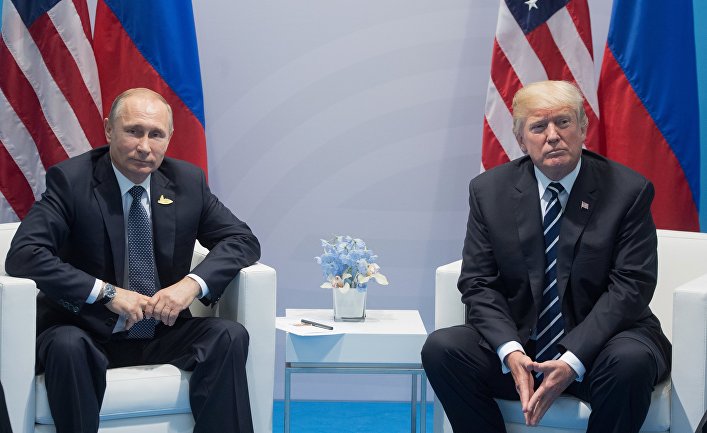Mark Adomanis
Contributor, "Forbes"
Over at the Bulletin of the Atomic Scientists, Pavel Podvig has a very interesting post about the mythology of missile defense and how it has wrongly been credited with ending the Cold War. The post covers a lot of ground (rather than block quoting half of it I’d simply encourage everyone to read it in full) but there are a few particular points I’d like to focus on.
The first is that, as Podvig very astutely notes, the current version of missile defense is radically different from its initial Reaganite conception. SDI was supposed to be a space-based system of lasers that could take out an almost limitless number of missiles. The current reality is far more banal: a few land-based interceptors scattered about the globe that are intended to counter primitive (and arguably non-existent) ICBMs from North Korea and Iran. It’s not popular to admit it on the right, where Saint Reagan is beyond all criticism apart from that directed at his amnesty of illegal immigrants, but the original vision of SDI has been a very expensive failure. Despite spending untold billions of dollars on missile defense, the United States will remain vulnerable to Chinese and Russian ballistic missiles for the foreseeable future. Even the minimal ability to shoot down a few missiles from "rogue” states is in doubt due to the interceptors’ incredibly spotty track record.
But there’s another topic that I wanted to focus on. Podvig hinted at it when he noted that the Soviets estimated that "technical counter-measures to defeat missile defenses would have cost no more than five percent of their SDI-like program.” The phrase "technical counter measures” has a very Soviet ring to it, and took me back to graduate school and the class I took on Russian/Soviet military doctrine. While one class certainly doesn’t make me an expert, one of the things that really impressed me about the Soviet approach to war was its comprehensiveness. The Soviets never treated anything in isolation, and while there would necessarily be a "technical” component to undermining missile defense this would not be the only aspect.
An example, I think, is the best way to demonstrate what I’m talking about. When people imagine a potential Soviet-NATO conflict in Europe they think of a Tom Clancy novel: the Soviets would line up all of their T-72s and Mig-29s, we would line up all of our Abrams tanks and F-15s, and then we’d go mano-a-mano to see who’s left standing. Many NATO war games assumed that there would be at least several days advance notice of any Soviet attack, and that there would be ample time to adequately position both front-line and reserve units. But the Soviets weren’t idiots, and they had absolutely no interest in confronting NATO at full strength. The most likely scenarios, the ones developed by strategists like my graduate instructor James Sherr, had the Soviets surprise attacking during a holiday, or during some sort of unit rotation: a time when NATO would be at its most vulnerable and over-extended. What the Soviets would absolutely never do is telegraph their intentions to NATO or conduct an attack on anything but the most advantageous terms. Instead they would use every political, diplomatic, and informational lever at their disposal to confuse their adversary and maximize uncertainty.
This is why the idea of full-scale anti-Soviet (or, now, anti-Russian) missile defense was always such a red herring. All of the "successful” missile defense tests to date have been under the most carefully controlled conditions imaginable. During a test, the interceptor operators knew where the missile was being launched from and when it was being launched. They even had a good idea of the missile’s size and shape. Basically, they had the sort of information that they would never ever have in combat conditions against the Russians (or any other half-competent adversary). Should there (God forbid) be any sort of Russian-American nuclear exchange, the Russians wouldn’t politely announce their intentions, they would, instead, do everything they could to maximize their chances of success. There would be dummy launches, fake warheads, decoys, everything you can imagine that would make it difficult if not impossible for any missile defense system to determine precisely what was happening.
There is a tendency among missile defense proponents and adversaries alike to treat the entire issue as a narrowly technical one. To use the most common phrase, it’s a question about the possibility or impossibility of "hitting a bullet with a bullet.” But that’s asking the wrong question. In any real-world scenario ballistic missile defense won’t be a simple feat of hitting a bullet with a bullet, it would be like hitting a bullet with a bullet when you’re not sure who’s shooting blanks and who’s shooting live ammunition, and you are being loudly heckled and pelted with snowballs. The Soviets were wrong about a great many things, but they were absolutely right to view military questions not in narrow technical terms but in a holistic and comprehensive sense.



_jpg/250px-ElbeDay1945_(NARA_ww2-121).jpg)








